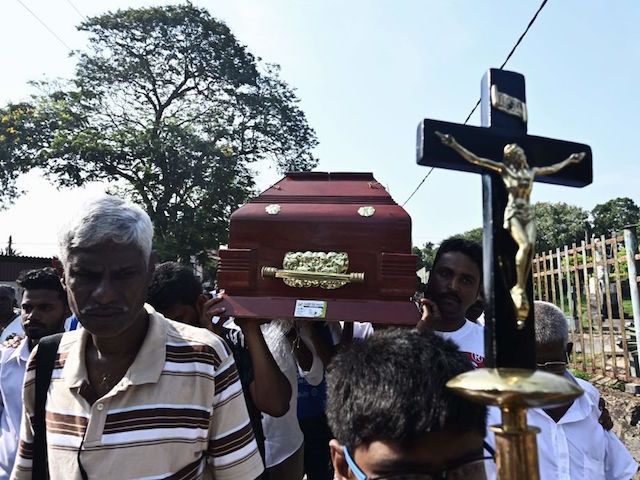The Sri Lankan opposition newspaper Colombo Telegraph accused President Maithripala Sirisena on Sunday of having direct knowledge of an Islamist plot to kill Christians on Easter, lying about it, and firing the nation’s defense chief to cover for the head of national intelligence, a personal friend.
Local jihadists believed to have ties to the Islamic State killed 253 people, mostly Christians, on Easter Sunday last week in a series of six bombings targeting three churches and three hotels hosting Easter breakfasts. Sirisena denied having any prior knowledge of plots against Christians after a letter surfaced from Indian intelligence officials specifically warning of such an attack less than a month before it occurred. Prime Minister Ranil Wickremesinghe and his cabinet accused Sirisena of keeping them uninformed by blocking them from daily intelligence meetings, but Sirisena claimed his intelligence officials did not tell him of the tip, either.
Sirisena fired his defense secretary and head of police, but not Chief of State Intelligence Service Nilantha Jayawardane, who ran the briefings Wickremesinghe was blocked from and is believed to have received the warning about an Easter jihadist attack.
The Telegraph cites several unnamed senior government ministers in confirming that the president had to know about the warning that jihadists would attack Christians on Easter, the holiest Christian holiday, because the intelligence chief is “his pet” and would not have kept the information from him.
“There is no way that the President did not know. I can imagine if the Defence Secretary did not warn him. But the SIS chief is his pet and he knew everything. They talked several times a day. There is no way Nilantha Jayawardane did not tell him what he knew,” the newspaper quotes a “senior” official as saying.
Another official agreed, suggesting that the president did not allow the attacks to happen out of bad faith but “may have decided not to act on his briefings in the belief that the attacks would be small scale ones.” Others claimed that Sirisena “did not fully understand” the briefings and so did not take action.
The Telegraph‘s sources claimed the president “was informed about the foreign intelligence reports predicting the attacks on at least three separate occasions”: April 11, April 16, and April 20. Intelligence chief Jayawardane relayed the information on all three occasions.
The unnamed sources in the Defense Ministry added that, while the head of intelligence briefed the president, Sirisena, in turn, did not inform the head of police or the defense secretary, the two individuals he fired following the attacks.
In a separate report Sunday, the Telegraph went further, not merely blaming Sirisena for failing to act with knowledge of the attack, but claiming that at least three governors in Sirisena’s parties had ties to National Thawheed Jama’ath (NTJ), the local jihadist group believed responsible for the Easter bombings. Sirisena banned the group this weekend, a week after initial reports surfaced tying NTJ to the group.
The Colombo Telegraph has faced censorship for years for publishing reports that criticize and embarrass the ruling government. In 2014, a year before Sirisena took office, the NGO Freedom House reported that the government had taken the Telegraph‘s website offline on multiple occasions, though it had denied doing so.
“Top leaders made ominous statements about social networks threatening national security, suggesting that their policy of regulating and punishing online dissent remains unchanged,” Freedom House noted at the time.
The president has denied any prior knowledge of the attacks. His first move following the revelation that Indian intelligence officers warned of an Easter attack in the island nation was to demand the resignations of Secretary of Defence Hemasiri Fernando and Inspector General of Police Pujith Jayasundara. As he targeted their superior, the unnamed defense ministry agents speaking to the Telegraph have reason to disparage the president, shifting the blame away from them.
Fernando attempted to defend Sirisena last week before his removal, claiming that Sri Lanka simply had too many churches for the government to protect.
Jihadists believed to have ties to the Islamic State killed 253 people on Easter Sunday in bombings targeting churches and hotels serving Easter breakfast. The Islamic State took responsibility for the attack, releasing photos of the alleged jihadists that included a man identified as Zahran Hashim, the founder of NTJ. Hashim had become regionally famous by posting violent jihadist screeds on Youtube and Facebook.
Despite Hashim’s high profile, senior Sri Lankan officials all denied prior knowledge that he was planning an attack. Wickremesinghe and several members of his cabinet expressed outrage when, on the Sunday of the attack, a letter apparently from Indian intelligence surfaced urging Sri Lankan officials to act against the plot. The president responded by insisting that his intelligence officials did not tell him they were warned, either.
Sirisena and Wickremesinghe have been at odds since the former attempted to illegally replace the latter in October with opposition leader and former President Mahinda Rajapaksa. After two months of a bitter power struggle that triggered a parliament brawl featuring lawmakers throwing chili powder in each other’s eyes, the Sri Lankan courts reinstated Wickremesinghe and declared the move to appoint Rajapaksa unconstitutional.
Wickremesinghe and his cabinet officials have not been allowed in Sirisena’s regular intelligence briefings since.
On Sunday, Sirisena organized a national security meeting inviting both Wickremesinghe and Rajapaksa, according to Colombo’s state news outlet. Sirisena reportedly announced the restructuring of intelligence so that all security tips get circulated to the officials who need them, an attempt to prevent another situation like the one this month.

COMMENTS
Please let us know if you're having issues with commenting.